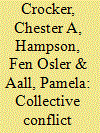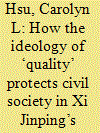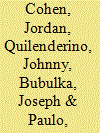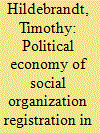|
|
|
Sort Order |
|
|
|
Items / Page
|
|
|
|
|
|
|
| Srl | Item |
| 1 |
ID:
102655


|
|
|
|
|
| Publication |
2011.
|
| Summary/Abstract |
This article surveys current security challenges and identifies obstacles to effective global and regional responses and cooperation in an era when security has become increasingly divisible. The new situation is partly explained by the complexity and variety of security challenges, both traditional and new, and by the linkages between them. It argues that a new pattern of improvised, ad hoc and often case-specific security mechanisms has developed, which it calls Collective Conflict Management (CCM). The argument is illustrated by reference to cases of CCM where a wide range of actors-multilateral institutions at the global and regional levels, individual states or ad hoc coalitions, professional and commercial bodies, and non-governmental organizations-collaborate in an effort to manage specific security threats and challenges, bringing together a variety of relationships, resources and skills. The urge for collective action, rather than unilateral or single actor-led, is motivated by a number of factors and 'drivers", not all of them necessarily positive or constructive. The article concludes that the success or failure of CCM will depend in part on the severity of the problems it faces and in part on the motives and incentives behind collective responses. This new pattern raises interesting and important questions for the future of international security. While CCM may be untidy and lack clear norms and standards, in many cases it may be the best available in an increasingly fractured world.
|
|
|
|
|
|
|
|
|
|
|
|
|
|
|
|
| 2 |
ID:
178171


|
|
|
|
|
| Summary/Abstract |
Under Xi Jinping, the Chinese state has asserted authoritarian control over many aspects of civil society. Yet there is evidence that Chinese citizens are continuing to mobilize and organize with relative levels of success. This article examines one mechanism that prevents the Chinese state from eliminating civil society: the political ideology of suzhi (素质), translated as ‘quality’ in English. In the post-Mao era, the Chinese Communist Party (CCP) has increasingly invested its political legitimacy in its ability to deliver a rising quality of life to its citizens. This dynamic means that it is possible for Chinese citizens to mobilize and organize to achieve their goals. Suzhi ideology gives citizens one set of means to effectively limit undesirable behaviour by the state. It also provides citizens with leverage to make the state respond robustly to their needs and desires. It opens up possibilities for citizens to solve social problems on their own, without recourse to state actors. This article will examine four arenas of Chinese civil society which suzhi ideology protects under the Xi regime: media-inspired public outrage; public protests and demonstrations; NGOs as state consultants; and the increased accessibility of litigation.
|
|
|
|
|
|
|
|
|
|
|
|
|
|
|
|
| 3 |
ID:
139547


|
|
|
|
|
| Summary/Abstract |
This article uses an institutional approach to examine Chinese NGOs as an emerging organizational field. In mature organizational fields, the organizations are powerfully constrained to follow the institutional practices of that field. However, in an emerging organizational field, the institutionalized constraints are not yet established, so actors can try out a wide range of practices. Some of these practices will become the new “rules of the game” of the organizational field when it is established. The content of these rules will shape the relationship between NGOs and the Chinese party-state for future generations. We find that a Chinese NGO's resource strategy is shaped by two interacting factors. First, NGOs operate in an evolving ecology of opportunity. Second, the social entrepreneurs who lead Chinese NGOs perceive that ecology of opportunity through the lens of their personal experiences, beliefs and expertise. As a result, the initial strategies of the organizations in our sample were strongly influenced by the institutional experience of their founders. Former state bureaucrats built NGOs around alliances with party-state agencies. In contrast, NGO founders that had no party-state experience usually avoided the state and sought areas away from government control/attention, such as the internet or private business.
|
|
|
|
|
|
|
|
|
|
|
|
|
|
|
|
| 4 |
ID:
121155


|
|
|
|
|
| Publication |
2013.
|
| Summary/Abstract |
The success of any humanitarian aid mission is generally measured by the timeliness of critical supplies that are delivered to the affected area. However, a more interesting analysis may be to determine the effect of the aid on the overall satisfaction of the local population. The authors' research focused on the delivery of humanitarian aid to a notional region that was decimated by flooding with ships, landing craft and security personnel provided by the US Navy and Marines. While the research effort addressed naval force structure, the focus of the research was: (1) to assess different delivery methods for the aid; and (2) to determine how the aid delivery impacted the overall satisfaction of the local population. To examine both concerns, two simulation models were developed, with one examining the throughput of aid delivered during the operation, and the other the satisfaction of the population based on the humanitarian aid effort.
|
|
|
|
|
|
|
|
|
|
|
|
|
|
|
|
| 5 |
ID:
114580


|
|
|
|
|
| Publication |
2011.
|
| Summary/Abstract |
The Chinese government uses legal registration to manage and control the rise of social organizations. To avoid negative government attention, organizations might be expected to actively pursue such registration. However, in-depth field research of Chinese NGOs in three issue areas (environmental protection, HIV/AIDS prevention, and gay and lesbian rights) reveals that this is not always the case. There are many conflicting political and economic incentives for both NGOs and government, complicating understandings of social organization registration in China. By shedding light on the process of registration, this article reveals the complexities of state-society relations and demonstrates the difficulties for social organizations to avoid significant government interference.
|
|
|
|
|
|
|
|
|
|
|
|
|
|
|
|
| 6 |
ID:
093644


|
|
|
|
|
| Publication |
2009.
|
| Summary/Abstract |
This essay offers a series of personal reflections about a number of factors that affect the field of contemporary China studies in the United States from the 1950s through the early 21st century.1 Two caveats are in order, however. First, perhaps because the author is a political scientist, the summary will be slightly skewed in favor of this discipline rather than economics, sociology, or the humanities - nonetheless I hope to capture the broad trends in the scholarly study of contemporary China since the People's Republic of China was established in 1949. Second, the field of China-watching in the United States today extends far beyond the academic scholarly community; it involves the U.S. Government, banks and corporations, law firms, and a wide range of non-governmental organizations (NGOs). Thus, the following summary only pertains to principal trends evident in one sector - the scholarly sector - of a much larger Sinological community today.
|
|
|
|
|
|
|
|
|
|
|
|
|
|
|
|
| 7 |
ID:
102340


|
|
|
|
|
|
|
|